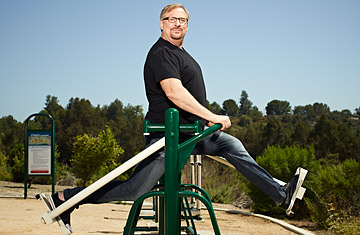
Pastor Power, Warren has lost 55 lb. so far, with 35 to go.
(2 of 6)
Warren reckoned that he was in a position to help change all that and on Jan. 15, 2011, launched the Daniel Plan, a sweeping health-and-fitness program for Saddleback members that begins with a commonsense diet of 70% unprocessed fruits and vegetables and 30% lean protein, whole grains and starchy vegetables. The plan includes exercise groups, nutrition training, sports, recipe tips, small support-group meetings, Walk and Worship sessions and more.
Warren and his team expected perhaps 200 people to sign up after the kickoff rally, but 6,000 did, with another 1,200 joining online — a number that has risen to 15,000. The church has lost a collective 260,000 lb. in the past year, and Warren jokes that he's shooting for the equivalent of a jumbo jet (800,000 lb., for the record, fully fueled and loaded). A man with Warren's profile attracts other big names, and Drs. Mehmet Oz, Daniel Amen and Mark Hyman — a cardiologist, a neurologist and a nutritionist (and significantly, of Muslim, Christian and Jewish roots) — have volunteered their time to the cause.
You don't have to be a cynic to observe that diet plans that make and at first support extraordinary claims are not new. But you don't have to be a person of faith — any faith — to admit that a wellness plan based at least in part on Scripture seems fresher. A robust body of scientific evidence supports a link between faith and health. Attendance at religious services has been shown to add two to three years to life, for example. You may believe there's something divine in that; you may believe it's simply the proven ability of any group to improve the welfare of all its members. Either way, you can't argue with the results.
"The community is the cure," says Hyman. "The group is the medicine. There are feedback loops, accountability, support."
Those are all things Warren's church serves up — along with a very generous helping of evangelical Christianity. The central belief that drives the Daniel Plan is best captured by a T-shirt many of the participants wear that reads, "God created it/ Jesus died for it/ The Holy Spirit lives in it/ Shouldn't you take care of it?" The it, of course, is the body, and evangelicals teach that it's not yours at all. Instead, our bodies are gifts from God, and we are expected to return them in the best shape possible. In the same way some religious communities found their way to environmentalism through the idea that we are only stewards of the earth, so too must we remember that we are not the sole owners of our flesh.
"My body is not my own. My body is on loan," says Jim Black, a physical therapist who joined the program with his wife Melanie. "I have to give it back."
The Book of Daniel does not actually prescribe a diet to help us look after ourselves. "Nowhere in the Bible does it say, 'This is what they should eat,'" says C.L. Seow, a Daniel scholar and professor at Princeton Theological Seminary. The critical passage, he explains, has to do with resistance, with a rejection of privilege. "The point is the triumph of God."
